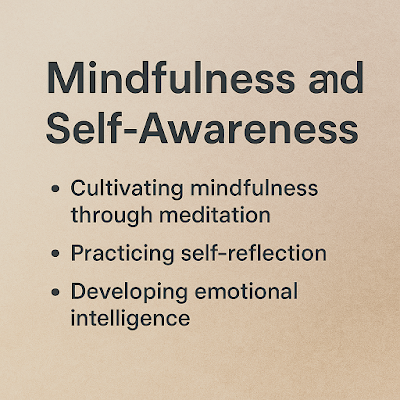Mastering the Mind Within: The Power of Mindfulness and Self-Awareness
Are You Truly Present in Your Own Life?
In today’s hyper-connected world, we’re constantly bombarded with noise—notifications, deadlines, distractions. But amidst all the external activity, how often do we check in with our internal world? Most of us scroll more than we reflect and react more than we pause.
Yet, what if the true key to fulfillment, clarity, and inner peace lies in one simple habit—awareness?
Mindfulness and self-awareness aren’t just wellness trends; they’re powerful life tools. When practiced consistently, they can transform your mental clarity, emotional balance, and decision-making. Let’s explore how you can cultivate mindfulness, practice self-reflection, and develop emotional intelligence to become your best self.
1. Cultivating Mindfulness Through Meditation
Mindfulness means being fully present—aware of where you are and what you’re doing—without becoming overly reactive or overwhelmed. It’s the art of living in the now.
Meditation is one of the most effective ways to nurture mindfulness. Just 5–10 minutes a day can:
- Calm racing thoughts
- Reduce stress and anxiety
- Increase focus and productivity
- Improve emotional stability
Try starting with simple breath awareness. Sit quietly, close your eyes, and follow your breath in and out. If your mind wanders, gently bring it back. This daily discipline rewires your brain for presence and peace.
2. Practicing Self-Reflection: Learning from Within
While mindfulness keeps you grounded in the moment, self-reflection helps you understand the why behind your actions and emotions.
Through regular reflection, you begin to ask:
- Why did I respond that way?
- What patterns keep repeating in my life?
- What do I truly want?
Journaling is a great tool for this. Write freely about your day, your thoughts, and how you felt. Over time, your entries reveal insights, triggers, and breakthroughs. Self-reflection transforms experience into wisdom.
3. Developing Emotional Intelligence (EQ)
Emotional intelligence is your ability to recognize, manage, and express your emotions—and understand others’ emotions as well. It’s a key skill for strong relationships, leadership, and personal growth.
You develop emotional intelligence by:
- Observing your emotions without judgment
- Naming what you feel and understanding why
- Practicing empathy in communication
- Responding rather than reacting
Mindfulness and reflection naturally lead to greater emotional intelligence. They help you stay calm in conflict, communicate clearly, and make decisions with heart and wisdom.
It All Begins Within
Mindfulness, self-reflection, and emotional intelligence are not separate paths—they’re intertwined. Together, they help you show up in the world with clarity, compassion, and confidence.
But awareness alone is not enough. Action is where transformation happens.
Start today:
- Take five quiet minutes to breathe.
- Write a short journal entry about how you're feeling.
- Observe your emotions without judgment.
Let these small daily habits lead you to a deeper version of yourself.
The journey to your best self starts now. Will you take the first step?





Comments
Post a Comment